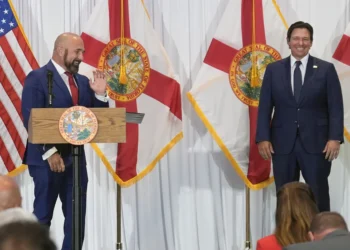Using $8.9 billion in unpaid grants awarded to Intel under the 2022 Chips Act, the U.S. government will take a 10% equity stake in the computer-chip company. The Trump administration and the company announced the deal on Friday. When Donald Trump sneezes, it gets a major reaction, so the government taking partial ownership of a private company — becoming its largest shareholder — certainly ruffled a few feathers.
Earlier this month, Trump argued that Intel CEO Lip-Bu Tan should be fired because of his ties to China. That precipitated a meeting between the two, after which Trump decided to change course and deepen the partnership. “I said, ‘I think you should pay us 10% of the company,’ and they said yes,” Trump explained. Tan said, “We are grateful for the confidence the president and the administration have placed in Intel.”
The obvious comparisons from recent history were the bailouts of major banks and the Big Three automakers. In those cases, politicians and corporate heads argued that bankruptcy or worse was inevitable without government aid. Intel lost $3.2 billion in the last fiscal quarter and has fallen behind competitors in market share, but it is not yet on the brink of bankruptcy.
Other even more recent comparisons are Trump’s deals with Nvidia, MP Materials, and Nippon Steel. The federal government putting its hand in private operations is becoming increasingly common.
As I noted above, reactions were swift and strong.
“Today it’s Intel, tomorrow it could be any industry,” warned Kentucky Republican Senator Rand Paul. “Socialism is literally government control of the means of production.”
Socialist Senator Bernie Sanders put a positive spin on that, saying, “Taxpayers should not be providing billions of dollars in corporate welfare to large, profitable corporations like Intel without getting anything in return.”
Others echoed Paul. Radio host and syndicated columnist Erick Erickson argued that it’s “socialism with an R next to its name.” He added, “Many of the original Tea Party voices that took to the streets over TARP and the GM take over are strangely silent or compliant over the Intel situation. Shameful and cowardly.”
Alumni of the first Trump administration chimed in, too. “Biden was wrong to subsidize the private sector with the Chips Act using our tax dollars,” former UN Ambassador Nikki Haley posted on X. “The counter to Biden is not to lean in and have govt own part of Intel. This will only lead to more government subsidies and less productivity. Intel will become a test case of what not to do.”
Economists Larry Kudlow and Stephen Moore, both of whom held advisory roles with Trump, talked it over and agreed. “I am very, very uncomfortable with that idea,” Kudlow said. Moore responded, “I hate corporate welfare. That’s privatization in reverse. We want the government to divest of assets, not buy assets. So terrible, one of the bad ideas that’s come out of this White House.”
Back to the word “socialism,” National Review’s Philip Klein disagrees. Instead, he points to that ideology’s kissing cousin: “The Intel deal is the first action Trump has taken that could accurately be described as fascist.” A lot of totally ignorant left-wingers throw around that word without a clue of what it actually means, essentially depriving it of any legitimate use. But Klein is using it literally — fascism is government control of business behind the facade of private ownership.
Obviously, as Klein well knows, Trump isn’t a Nazi, so what’s he up to?
“The United States paid nothing for these Shares, and the Shares are now valued at approximately $11 Billion Dollars,” he explained on Truth Social. “This is a great Deal for America and, also, a great Deal for INTEL. Building leading edge Semiconductors and Chips, which is what INTEL does, is fundamental to the future of our Nation. MAKE AMERICA GREAT AGAIN! Thank you for your attention to this matter.”
In essence, he’s arguing that because the Chips Act already authorized the expenditure, he’s just making the most of it in the same way Sanders spoke about a return on investment for taxpayers. He also likely thinks that, in order to compete with China and its state-controlled manufacturing, the U.S. is going to have to play by similar rules. (Trump does this in all sorts of arenas, refusing to play by rules his opponents won’t use.)
Given that so many things — from automobiles to household appliances — rely on computer chips, Trump isn’t wrong to see strategic need and opportunity here. That’s why it was so important when Taiwan President Lai Ching-te and his country’s top chipmaker TSMC announced a $100 billion investment in U.S. manufacturing back in March.
(Countering China is also why Trump must enforce the TikTok ban, which he’s so far refusing to do. But that’s another story.)
Taiwan’s investment here isn’t enough, either. “We cannot rely on Taiwan, which is 9,500 miles away from us and only 80 miles from China,” asserted Commerce Secretary Howard Lutnick. “So, you can’t have 99 percent of leading-edge chips made in Taiwan. We want to make them here.” He added, “One of those pieces is it would be lovely to have Intel be capable of making a U.S. node or a U.S. transistor, driving that in America.”
The government, by the way, won’t exercise governing authority in Intel or even hold a seat on the board, which runs counter to the socialism/fascism critique. Still, for decades, we’ve argued that it’s trouble when the government picks winners and losers. Trump has his reasons, but he clearly doesn’t share that same philosophy, and he always seems to put his unique stamp on doing things.
















